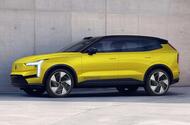Electric equivalent of best-selling XC60 SUV will be ‘huge boost’ to firm’s EV ambitions, claims financial chief
The new Volvo EX60, which is set to arrive in 2026, will be the first car to sit on an advanced new platform that is highly scalable and features advanced computing technology.
The EX60 will be a key model for Volvo’s electric switch as the EV equivalent of the hugely popular XC60 family SUV, which has long been the Swedish firm’s best-seller.
Beyond confirming the EX60 title, Volvo has yet to give any firm details of the new model, although financial chief Björn Annwall told Autocar that “it’s going to be a huge boost, a step change in our electrification journey.”
He added: “I would call XC60 the heart of the Volvo model portfolio; it’s in the middle of it and our best-selling car. It’s a fantastic car, and one a lot of people are waiting to get as a full electric option. So the day we have that you’re going to see a big shift in electrification.”
The EX60 is likely to broadly match the dimensions of the XC60 (pictured below), and will doubtless take styling cues from the EX30 and EX90 EVs that it will sit between in the line-up.
Volvo has confirmed the EX60 will be the first model to sit on an advanced new electric vehicle platform called SPA3, and will use the same Volvo Cars Superset technology stack – effectively the hardware and software that runs the vehicle and its functions – as the EX90 and the ES90 saloon that will arrive next year.
The SPA3 platform is a heavy development of the SPA2 platform that was first used by the EX90. Volvo R&D boss Anders Bell said that it was “a big step from a mechanical perspective, but from a software electronics perspective, it’s a straight evolution”.
He added: “All the work we’re putting into EX90 will go directly into the SPA3 cars as well. It’s basically the same software stack. SPA3 is designed from the beginning to be much more scalable, in size and price point and across regions, but also scalable in volume.”
As previously revealed by Autocar, the EX60 will be the first Volvo designed to benefit from megacasting, a technology set to be introduced with the SPA3 that allows for entire sections of a vehicle to be created as a single part rather than multiple elements. That, along with other changes and the more modular nature of the SPA3, will also lower production costs.
Volvo has said that the SPA3 could theoretically be used for cars smaller than the EX30 and bigger than the EX90. Bell added: “It’s designed for scale in every dimension: when it comes to size, my job is to make sure that the company has optionality. We are designing [the SPA3] to be scalable from B to F [segments], to make sure that we have flexibility and that we can launch the products that markets decide they want when they want it.”
Since all future new Volvo models will share the same basic tech stack, Bell added that it will allow for more focused and rapid development. “Because it’s all one technology stack, there’s no repeat of work,” he said. “It’s the same software stack, same basic electrical architecture. Yes, it’s scalable in size, price and capabilities, but it’s not spreading our products in different ecosystems.
“Everything we do gets married to the Volvo connected car cloud. If you look at successful tech companies, they’re all single tech stack companies where all their products are interlinked. Apple’s a good example: hardware, software, telephones, laptops, they’re basically all interconnected with the same software. That’s one example of where we need to be converging as a technology company going forward. Our focal point is safety, sustainability and creating this fantastic customer experience all wrapped in this Scandinavian design, on one tech stack.”







